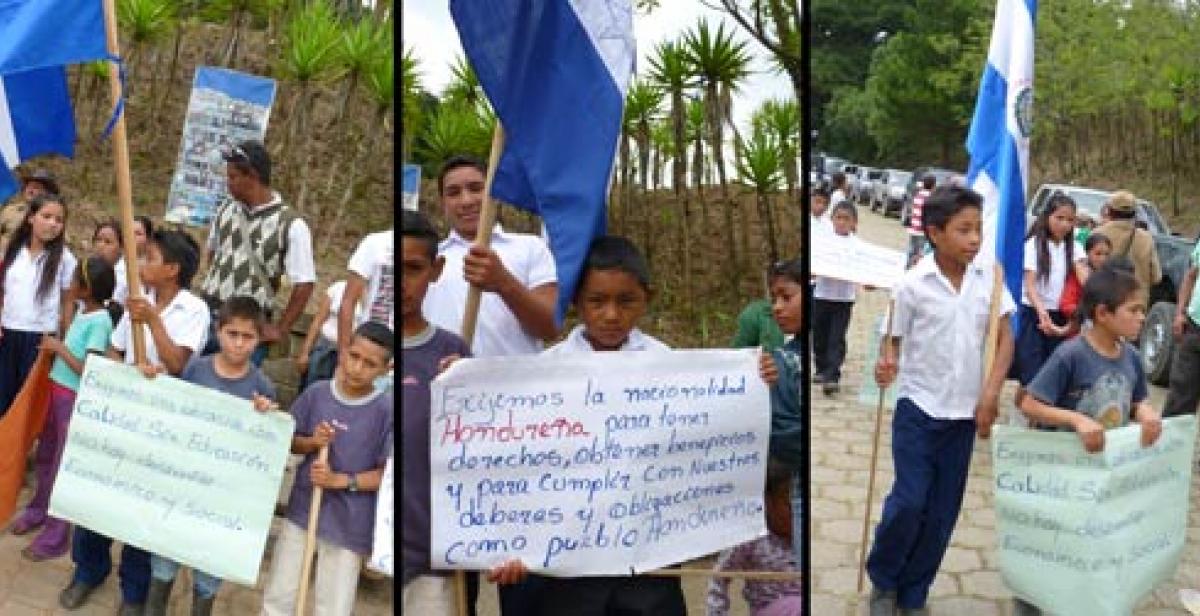Forgotten community fights for development for the people
Nahuaterique is one of those places on earth where people are not citizens, just people. Driving along the potholed path that leads to this forgotten town only gives you a taste of the extent of the neglect they suffer. Ignored by the Honduran state for 18 years, life in Nahuaterique is full of potholes – people do not hold Honduran identity nor land deeds or the kinds of documents we in Europe take for granted; there are no doctors or formal schools either, and few people have electricity and running water.
Yet far from discouragement and self-compassion, what struck me most when I visited Nahuaterique only a few weeks ago was how empowered and determined people felt to change the course of events and assert their rights once and for all.
The current state of things goes back to the early 1990s, as the town of Nahuaterique was the subject of a border dispute between El Salvador and Honduras. In 1992, the International Criminal Court of Justice in The Hague ruled that from then on, it would belong to Honduras.
Unbelievable as it might sound, rather than easing the transition to the new status quo, the Honduran and Salvadorian states left Nahuaterique in a practical limbo for 18 years - to a point that a meagre 200 people in a town of 7,000 inhabitants have received identity papers so far. And as the people stressed to me during my visit, only those granted Honduran identity can access the state assistance they badly need.
I talked to Ernestina López, a mother of two daughters, who said: “Despite so many years fighting for our right to dual nationality to get recognised, I still only hold Salvadorian nationality. And without Honduran papers, I can’t get food vouchers or other social benefits for my children.”
“We are treated as foreigners in our own land,” José Amílcar told me. “We can’t choose our representatives and are not listened to at all. The nationality issue is the most worrying one. On top of that, lacking a land title makes our life tougher as we cannot access agricultural credit.”
Dinora Romero said health centees have no medicines and there are only four nurses and an intern from medical school to look after the entire community. The roads are just “in dreadful conditions, to the extent that vehicles cannot access the community during the rainy season and people simply have to walk.”
In spite of this catch-22 which keeps the people trapped in extreme poverty, when I visited Nahuaterique and took the people’s pulse, I sensed that 2010 might represent a turning point in their fight to escape the cycle of poverty and exclusion.
Firstly, Honduran government authorities, headed by the Foreign Affairs Minister, put in an appearance in Nahuaterique on 6 May 2010 to give out 617 land ownership titles. It was encouraging to see that the authorities were met by organised people who reminded them that while those titles were a starting point, they were the first ones to be given in almost two decades, and represented a scarce 20 per cent of the total census.
That day, the people of Nahuaterique also urged Honduras and El Salvador to make a move. “We want you to know that we are running out of patience and are more determined than ever to attain our main demands – the naturalisation of our people and turning Nahuaterique into a municipality in order to bring development to our community,” read their public manifesto.
The atmosphere in the town made it obvious what my fellow Progressio development worker José Ramos would confirm later – that the people of Nahuaterique have rallied around to back their municipal council, and that this is pivotal to move the whole process forward.
Nahuateriqueans clearly conveyed to me a mixed impression of decision and tiredness in the face of a situation they never sought and yet, they have endured for too long. One after another, they said they would be willing to carry out public demonstrations to make their voices heard if needed. “We have been waiting for 18 years: enough is enough.”
Today, a few weeks after promises from the authorities were made and far from that day’s spotlight, I turned again to my colleague José. He supports the provisional Nahuaterique council in their struggle for legal recognition – in fact, Progressio is the only organisation which has supported the Nahuaterique process side by side since the 1992 ruling. Is the process moving forward? I asked him.
Well, actually, it is. José tells me there is a breeding ground to move things forward as the authorities are more open to ease the process. He also finds it promising that a coordinating table bringing together local organisations and community leaders has just been set in motion in Nahuaterique. This is a platform that aims to work with Salvadorian and Honduran authorities to unlock the process and give political momentum to the community’s main demands.
Progressio’s development worker has worked hard to ensure that the people of Nahuaterique will have a say on issues affecting them and will no longer be left out of decision-making. A breakthrough in this regard is that Nahuaterique will be monitoring all the activities and agreements taken by the authorities throughout the process.
“No doubt this is a leap forward,” says José. “It means the legalisation process will be more inclusive, respectful to the community and effective.” And no doubt this is the beginning to turn some ideas around and start looking at Nahuateriqueans not only as people, but also as citizens.
Nuria Zayas is a Progressio development worker in Honduras
Photo: The Nahuaterique community demonstrating to government authorities



